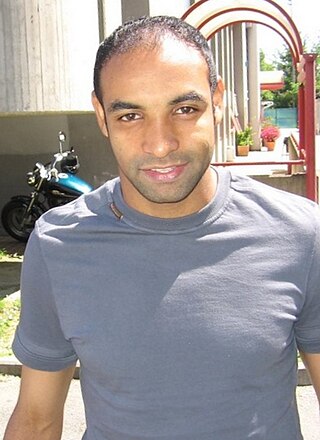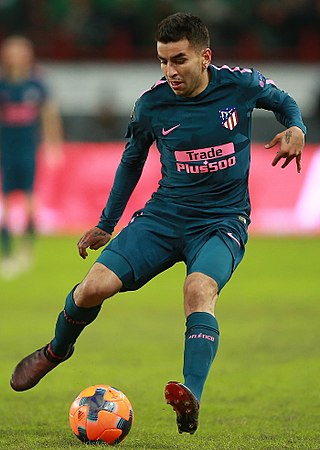The European/South American Cup, more commonly known as the Intercontinental Cup and from 1980 to 2004 as the Toyota European/South American Cup for sponsorship reasons, was an international football competition endorsed by UEFA (Europe) and CONMEBOL, contested between representative clubs from these confederations, usually the winners of the UEFA Champions League and the South American Copa Libertadores. It ran from 1960 to 2004, when it was succeeded by the FIFA Club World Championship, although they both ran concurrently in 2000.

Alfredo Stéfano Di Stéfano Laulhé was an Argentine-born professional footballer and coach who played as a forward, regarded as one of the greatest footballers of all time. Nicknamed "Saeta rubia", he is best known for his achievements with Real Madrid, where he was instrumental in the club's domination of the European Cup and La Liga during the 1950s and 1960s. Along with Francisco Gento and José María Zárraga, he was one of only three players to play a part in all five European Cup victories, scoring goals in each of the five finals. Di Stéfano played international football mostly for Spain after moving to Madrid, but he also played for Argentina and Colombia.
The FIFA Club World Cup is an international men's association football competition organised by the Fédération Internationale de Football Association (FIFA), the sport's global governing body. The competition was first contested in 2000 as the FIFA Club World Championship. It was not held from 2001 to 2004 due to a combination of factors in the cancelled 2001 tournament, most importantly the collapse of FIFA's marketing partner International Sport and Leisure (ISL), but since 2005 it has been held every year, and has been hosted by Brazil, Japan, the United Arab Emirates, Morocco and Qatar. Views differ as to the cup's prestige: it struggles to attract interest in most of Europe, and is the object of heated debate in South America.

Emerson Ferreira da Rosa, simply known as Emerson, is a Brazilian former professional footballer who played as a defensive midfielder. At international level, he played 73 games for the Brazil national team between 1997 and 2006, scoring 6 goals. With Brazil, he has taken part in two FIFA World Cups, two editions of the Copa América, and three Confederations Cups, winning the 1999 Copa América and the 2005 FIFA Confederations Cup, while also reaching the 1998 World Cup Final.

Oscar Alfredo Ruggeri is an Argentine former professional footballer who played as centre-back. Nicknamed El Cabezón, Ruggeri achieved success at the international level with the Argentina national team, being part of the teams that won the 1986 FIFA World Cup, two editions of the Copa América and the 1992 King Fahd Cup. At the club level, Ruggeri's most successful stint was with Argentine club River Plate, where he won the 1986 Copa Libertadores the 1986 Copa Interamericana and the 1986 Intercontinental Cup. Known for his rough style of play when marking opposing players and aerial ability, Ruggeri is considered one of the all-time best defenders to come out of Argentina. Following his retirement as a player, Ruggeri turned to managing, where he held posts in Argentina, Mexico and Spain. His last job as a manager was in 2006 with Argentine club San Lorenzo. Since then, Ruggeri went on to have a career on Argentine television, as commentator on football shows. He is currently a member of 90 Minutos de Fútbol, which airs in Fox Sports Latin America.
The following are the football (soccer) events of the year 2003 throughout the world.
This page indexes the individual year in association football pages. Each year is annotated with one or more significant events as a reference point.

Marrakesh Stadium is a multi-use stadium in Marrakesh, Morocco. It was designed by Gregotti Associati International.
The FIFA Club World Cup is an international association football competition organised by the Fédération Internationale de Football Association (FIFA). The championship was first contested as the FIFA Club World Championship in 2000. It was not held between 2001 and 2004 due to a combination of factors, most importantly the collapse of FIFA's marketing partner International Sport and Leisure. Following a change in format which saw the FIFA Club World Championship absorb the Intercontinental Cup, it was relaunched in 2005 and took its current name the season afterwards.

The 2013 FIFA Club World Cup was the 10th edition of the FIFA Club World Cup, a FIFA-organised international club football tournament between the winners of the six continental confederations as well as the host nation's league champions. It was hosted by Morocco, and played from 11 to 21 December 2013.

The 2014 FIFA Club World Cup was the 11th edition of the FIFA Club World Cup, a FIFA-organised international club football tournament between the winners of the six continental confederations as well as the host nation's league champions. It was hosted by Morocco for the second year in a row, and played from 10 to 20 December 2014.
The 2013 FIFA Club World Cup Final was the final match of the 2013 FIFA Club World Cup, an association football tournament hosted by Morocco. It was the 10th final of the FIFA Club World Cup, a FIFA-organised tournament between the winners of the six continental confederations as well as the host nation's league champions.

Ángel Martín Correa is an Argentine professional footballer who plays as a forward and winger for La Liga club Atlético Madrid and the Argentina national team.
The following are the scheduled events of association football for the year 2015 throughout the world.

The 2015 FIFA Club World Cup Final was the final match of the 2015 FIFA Club World Cup, an association football tournament hosted by Japan. It was the 12th final of the FIFA Club World Cup, a FIFA-organised tournament between the winners of the six continental confederations as well as the host nation's league champions.

The 2017 FIFA Club World Cup Final was the final match of the 2017 FIFA Club World Cup, the 14th edition of the FIFA Club World Cup, a FIFA-organised football tournament contested by the winners of the six continental confederations, as well as the host nation's league champions. The final was played at the Zayed Sports City Stadium in Abu Dhabi, United Arab Emirates on 16 December 2017 and was contested between Spanish club and title holders Real Madrid, representing UEFA as the reigning champions of the UEFA Champions League, and Brazilian club Grêmio, representing CONMEBOL as the reigning champions of the Copa Libertadores.

Boca Juniors is an Argentine professional football club based in Buenos Aires. The club first participated in a South American competition in 1919. The first international cup they took part in was the Copa Aldao in which they participated as champions of Argentina. The club competed in AFA/AUF cups from 1919 to 1946 and since entering the Copa Libertadores, in 1963, the club has competed in every CONMEBOL-organized competition, except the Copa CONMEBOL, Intercontinental Champions' Supercup, Suruga Bank Championship, Copa Merconorte, Copa Master de CONMEBOL and Copa Ganadores de Copa, most of them are extinct.

The 2022 CAF Women's Champions League was the 2nd edition of the annual African women's association football club tournament organized by CAF held in Morocco from 30 October to 13 November 2022. The winners of this edition will automatically qualify for the following edition of the tournament.











